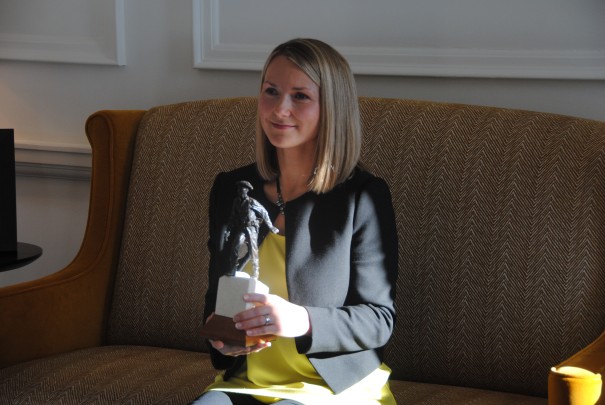Royal Humane Society Silver Medal and Charles Upham Award for Bravery

Nga mihi o te ra ki a koutou. Greetings to you all.
I specifically acknowledge: Marzena Simpson, Assistant Commissioner Malcolm Burgess, Joe Wignall and Mr Norman West of the Royal Humane Society of New Zealand, and Virginia McKenzie, representing the Charles Upham Award; tēnā koutou katoa.
It is a great pleasure to welcome you all to Government House today to acknowledge the extraordinary bravery of Marzena Simpson.
Citation
On 25 February 2013 at 9:00am, Gabriella Knott was attempting to cross the rail lines at a railway level crossing in Auckland when the rear stability wheels of her wheelchair fell into the gap between the path and the rail behind her. She was left in the middle of the track, unable to free the wheels, or to move out of the chair.
At the same time, an oncoming freight train rounded the corner and approached the crossing. When the train driver realised what was happening, he applied the emergency brakes and sounded the warning horn continuously as the train, towing approximately 50 unladen carriages, slid towards Ms Knott.
Two bystanders, Marzena Simpson and Mattieu Mereau, rushed to help Miss Knott. They tried to wrestle the wheelchair free, but were unable to do so. Just before the train hit the group, Mr Mereau managed to tip the chair forward and the trio fell. They were still in the path of the train which, after it had collided with them, came to a stop 90 metres past the crossing.
Gabriella Knott was hit and dragged along the side of the train for a considerable distance. She received massive injuries to her legs and head. The train stuck Marzella Simpson a glancing blow and she received significant injuries to her leg and grazing. Both women were hospitalised. Mattieu Mereau was uninjured and he provided support to Mrs Simpson until others arrived on the scene. Their lifesaving actions averted Ms Knott’s certain death and could well have cost them their own lives.
Charles Upham VC has a special place in New Zealand history as one of the few men to have been awarded the Victoria Cross twice.
Nearly ten years ago, Prime Television asked New Zealanders to rank 100 New Zealand history makers. Upham was nominated into fourth place, after Ernest Rutherford, Kate Sheppard and Edmund Hillary.
His high place on the list shows how much we as a society value our heroes – our real heroes.
I say ‘real heroes’ because these days, the word ‘hero’ is used freely in the media and its meaning has been diminished.
‘Hero’ and ‘bravery’ should be reserved to describe individuals who have risked their lives or wellbeing for the greater good.
The Royal Humane Society and the Charles Upham Award give due public recognition to people who do deserve to be described as heroes.
It is natural for our communities to want to thank such people. We have an early example of this in 1863, when the people of Nelson raised money to recognise the bravery of Huria Matenga and four others who had risked their lives to save the crew of the Delaware during a terrible storm.
Huria, her husband Hemi and his brother Ropata were all presented with inscribed watches.
At the presentation, Hemi Matenga said they did not expect such reward, and only did what they could out of a desire to save life.
This modest response from brave people is not uncommon – and was certainly very much evident in the character of Charles Upham.
He was uncomfortable with the attention he received and he always maintained that others were just as worthy of the honours he received.
Heroes might think that what they have done is nothing out of the ordinary – but to the rest of us, their actions are extraordinary.
They are not only altruistic and courageous. They also know the right thing to do and put it into action; and they can overcome the fear that stops most people from getting involved.
These qualities make the difference between being a concerned bystander or being ready to pitch in to save the day.
Marzena Simpson and her companion Mattieu Mereau did what very few people would contemplate. They put aside their concern for their own safety. They knew there was a good chance that they would be injured or killed, but they put those thoughts aside as they acted to save the life of Gabriella Knott.
The fact that Marzena is receiving two awards today is testament to the resolve and determination she showed in the face of extraordinary personal danger.
Thank you all for coming along today to take part in this ceremony. I now invite you to join me for refreshments in the Conservatory, but before we conclude, may I invite you to join me in singing the national anthem, God Defend New Zealand in Māori, then in English.
Anthem
Thank you ladies and gentlemen.
ENDS
